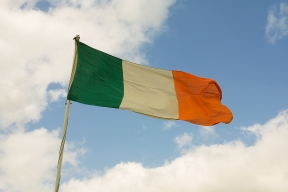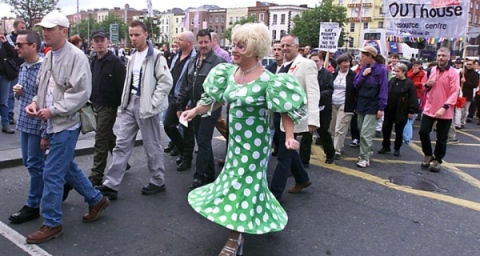October 31, 2013 at 6:57 am · Filed under Racism ·Tagged Ireland, Irish society, Race, Racial State, Racialisation, Racism, Roma, Sociology
Source: Irish Times
The dilemma faced by the gardaí involved in the removal of two Roma children from their homes last week was, supposedly, “Damned if they do and damned if they don’t.” There was no dilemma: they would not have been damned if they had not removed the children.
They had no authority to remove the children, since, it is apparent, there was not “a reasonable ground for believing that there [was] an immediate and serious risk to the health or welfare of [the children concerned]”. (Had there been such a risk, the other children in those homes should also have been removed.) What the gardaí did had the appearance of illegality, something that is obscured by the “damned if they do and damned if they don’t” refrain.
Continue reading
Permalink
October 6, 2013 at 2:33 pm · Filed under Education ·Tagged Atheism, Catholic Church, Catholic schools, Educate Together, Ireland, Religion, Secularism
Source: The Atlantic
Lennon is among a growing number of Irish parents who no longer identify with the Catholic Church and struggle to find schools that don’t clash with their convictions. In Ireland—once considered the most Catholic country in the world—the Catholic Church runs more than 90 percent of all public schools. Other religious groups operate another 6 percent. But Ireland’s religiosity has waned in recent years, amid changing demographics, rising secularism and reports of Church sexual abuse and cover-ups.
Weekly church attendance among Irish Catholics dropped from more than 90 percent to 30 percent in the past four decades. Those in Ireland who identify as religious plummeted from 69 percent in 2005 to just 47 percent last year, according to a WIN-Gallup International poll. And the number of people who chose “no religion” in the last census soared, making non-believers the second largest group in the nation.
These changes are starting to crack the Catholic Church’s monopoly on Irish education, but not quickly enough to meet growing parental demand for school diversity. Polls show that as many as three in four parents say they would send their children to schools run by groups other than churches, if given the choice. But alternatives are sparse. The most prominent substitute for church-run education is a multi-denominational model from Educate Together, a group with no church affiliation that operates just 65 of Ireland’s nearly 3,200 primary schools.
Continue reading
Permalink
May 15, 2013 at 3:26 pm · Filed under Employment ·Tagged Dan O'Brien, Demographic profile, Disposable and discretionary income, Economic And Social Research Institute, Ireland, Irish sociology, Irish Times, Negative equity, Social Research Institute, Sociology, Unemployment

By Dan O’Brien for the Irish Times
New research shows in the starkest terms yet how younger people were much more seriously affected by the property crash and resultant recession than older age groups.
A paper published yesterday by Petra Gerlach-Kristen of the Economic and Social Research Institute finds that those aged under 45 suffered far more than older age groups in terms of unemployment, disposable income, weekly spending, mortgage arrears and negative equity in the five years to 2009/10.
The single biggest difference between the two groups over the period is in weekly spending when housing costs, such as mortgage repayments and rents, are excluded.
Continue reading
0.000000
0.000000
Permalink
April 27, 2013 at 2:50 pm · Filed under Abortion ·Tagged Abortion, Abortion debate, Abortion referendum, Catholic Church, Enda Kenny, Equal rights, Fine Gael, Irish constitution, Irish society, Irish Times, Kenny, Law, Legalization of abortion, Religious views, Taoiseach, Taoiseach Enda Kenny, Women

Are we?
Taoiseach Enda Kenny is on record for saying: “I do not propose to have another referendum [on abortion]. There will be no new rights. The law is not being changed… The law is being codified and the law when clarified will deal strictly with the Constitution… It is a complex matter, it is one which requires sensitivity and understanding.”
How do you feel about Kenny’s recent statement on the abortion referendum? What are the complexities in this debate? I’m interested in hearing how everyone feels about the legalization (or lack thereof) of abortion in Ireland.
0.000000
0.000000
Permalink
April 22, 2013 at 2:42 pm · Filed under Irishness ·Tagged Flag, Ireland, Irish culture, Irish society, Irish symbols, National identity, Nationalism, Symgolism, Tricolour

wikimedia.org
By Manchán Magan for The Irish Times
The flag has moved far from its championship of women and workers. It’s now most commonly seen draped around the shoulders of exultant sport fans on their way to a match – and, later, used like a humanitarian blanket by the same fans stumbling home, wrapped in it for consolation or warmth. But it still has potency, most noticeably in Northern Ireland, where your heartbeat eases as you pass from red, white and blue pavement into an area of green, white and orange.
Continue reading
0.000000
0.000000
Permalink
April 21, 2013 at 10:47 am · Filed under Marriage ·Tagged Bigotry, Breda O'Brien, Discrimination, Fintan O'Toole, Gay Lesbian and Bisexual, Gay marriage, Irish society, Irish Times, Liberal values, Marriage, Same-sex marriage

Marchers cross O’Connell Street in Dublin at a recent Dublin Lesbian Gay Bisexual Transgender Pride march. Photograph: David Sleator
By Breda O’Brien for Irish Times
It may seem odd to describe Fintan O’Toole’s article on gay marriage ( Opinion , Tuesday April 16th) as a classic exposition of liberal values, given that the only reason he can conceive of for opposing gay marriage is bigotry motivated by revulsion for gay people.
Admittedly, it does seem distant from “I disapprove of what you say, but I will defend to the death your right to say it.”
But it remains a brilliant exposition of liberal values. Take this: “A marriage freely entered into is a personal relationship. It stands or falls, endures or collapses, is a heaven or a hell, solely because of the way the people in that relationship treat each other.”
Continue reading
0.000000
0.000000
Permalink
April 20, 2013 at 2:20 pm · Filed under Ethnicity ·Tagged Council of Europe, Discrimination, Ethnic group, Ethnicity, Human Rights, Ireland, Irish Traveller, Minorities, Minority group

By Patrick Counhihan for Irish Central
The Council of Europe has warned that Ireland needs to take action on discrimination against the Travelling community in the workplace – and wants Travellers recognized as an ethnic minority.
The Council has issued a report on what it calls the ‘de facto exclusion of members of the Travelling community in Ireland from the labour market.’
The Irish Times reports on the Council’s research into Ireland’s implementation of the European treaty on the protection of national minorities.
The paper says the human rights watchdog found that members of the Travelling community continue to experience discrimination in accessing the labour market and health services in Ireland.
Continue reading
0.000000
0.000000
Permalink
April 17, 2013 at 1:17 pm · Filed under Inequalities ·Tagged Boys club, Dail, Female Taoiseach, Fiona Hyde, Gender quota, Ireland, Irish, Politics in Ireland, Politics news, Women, Women for Election
By Fiona Hyde for World Irish
It’s a sad reality that a political life seems closed off, exclusive or unfeasible for most women. The boys club needs to become unacceptable and it needs to go.
There is hope. In that admittedly meagre 15% of the Dáil are some excellent role models and trailblazers for women in politics who we must cherish. There is a broad base of support for gender quota implementation.
There are fantastic initiatives such as Women For Election, who work to “inspire and equip women to succeed in politics” with training and support programmes.
We need to realise a lack of women means a lack of true representation of our population, with legislation to match. We need to consistently question the lack of women’s voices in the government chambers as well as in our media. We need to support women. I don’t know about you, but I’d like to see a female Taoiseach in my lifetime.
Who will it be?
Full article
0.000000
0.000000
Permalink
April 15, 2013 at 6:52 am · Filed under Marriage ·Tagged Catholic Church, Convention, Electorate, Gay marriage referendum, Ireland, Irish, Irish constitution, Law, News, Religion news, Same-sex marriage

Ireland is to vote on whether to legalise gay marriage. Photograph: Alamy
By Henry McDonald for The Guardian
Ireland is to hold a referendum on legalising gay marriage after a special convention set up to reform the Irish constitution recommended that same-sex couples in the republic be recognised in law.
The convention voted 79% in favour of full equality for same-sex marriage in Dublin on Sunday.
Under the Irish constitution any major constitutional change has to be ratified by the electorate.
Continue reading
0.000000
0.000000
Permalink
April 14, 2013 at 4:34 pm · Filed under Irishness ·Tagged Arts, Film, Hibernia college, Ireland, Irish, Irish Identity, Irishness, Literature, Meaning, Online course, poetry, Theatre

By Matt Keough for Irish Central
In perfect harmony with Ireland’s push for tourism, Hibernia College is offering a free online course where students will dive into a sea of literature, poetry, theatre, film, language, art, sport and landscape that plans to create an understanding for the multifaceted Irish identity.
The course features a number of contributions from prominent Irish doctors, authors, filmmakers, businessmen and others.
With The Gathering in shouting distance, the Irish tourism industry, which is accused of, “reaching out and inviting it to come here,” by Minister for Arts, Heritage and the Gaeltacht Jimmy Deenihan, will hope to see the course catalyze more vacationing and consumer spending.
Continue reading
0.000000
0.000000
Permalink







